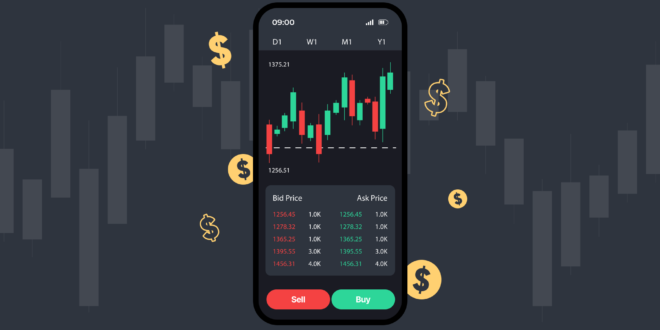Investment has undergone a transformative shift in recent years due to technological advancements and changing investor preferences. One such innovation that has gained substantial traction is real estate crowdfunding. This innovative approach allows investors to pool their resources online to invest in real estate projects that were once only accessible to a select few. In addition, the rise of online trading apps has further democratized investment opportunities, offering users various options beyond traditional financial instruments. This article delves into real estate crowdfunding and online trading apps, highlighting their features, benefits, and considerations.

Real Estate Crowdfunding: Unlocking New Avenues of Investment
Real estate crowdfunding involves pooling funds from various investors to finance a real estate project, such as residential, commercial, or industrial developments. This approach has gained popularity due to its accessibility, diversification benefits, and potential for attractive returns. Here’s how it works:
- Platform Selection: Investors can choose from online platforms hosting real estate crowdfunding opportunities. These platforms provide detailed information about different projects, allowing investors to make informed decisions.
- Investment Options: Real estate crowdfunding offers various investment models, such as equity-based, debt-based, and hybrid models. In equity-based crowdfunding, investors become partial property owners, sharing profits and risks. In debt-based crowdfunding, investors provide loans to developers in exchange for fixed-interest payments.
- Diversification: Real estate crowdfunding enables investors to diversify their portfolios by participating in multiple projects with varying risk profiles. This reduces the impact of a single project’s failure on an investor’s overall holdings.
- Accessibility: This approach democratizes real estate investment by lowering the barrier to entry. Investors can participate with relatively small amounts of capital, allowing them to explore opportunities once reserved for high-net-worth individuals.
- Transparency: Crowdfunding platforms typically offer detailed project information, including financial projections, property details, and developer backgrounds. This transparency empowers investors to make well-informed decisions.
Benefits and Considerations
Real estate crowdfunding offers a range of benefits and considerations that investors should carefully weigh before participating in this innovative investment model.

Benefits
Let’s delve into some of the benefits;
- Diversification: Investors can spread their capital across different projects, reducing overall risk.
- Accessibility: Real estate crowdfunding welcomes investors with various budgets, fostering inclusivity.
- Passive Income: Investors can receive rental or interest payments depending on the investment model.
- Reduced Effort: Investors don’t need to be actively involved in property management; the platform handles the logistics.
- High-Quality Deals: Crowdfunding platforms often vet projects rigorously, ensuring quality investment options.
Considerations
Here are some of the considerations;
- Risk: As with any investment, inherent risks include project failure, market downturns, and liquidity concerns.
- Regulations: The regulatory landscape surrounding crowdfunding varies by region and may impact investor protections.
- Long-Term Commitment: Real estate investments are generally long-term, so investors must be patient to realize returns.
- Platform Reliability: Investors should choose reputable platforms with a track record of successful projects.
Online Trading Apps: Expanding Investment Horizons
Online trading apps (like Bitcoin Profit) have revolutionized investment by allowing users to trade a wide range of financial instruments from the convenience of their smartphones. These apps have expanded investment horizons beyond traditional options like stocks and bonds.
- Asset Variety: Online trading apps allow users to invest in stocks, exchange-traded funds (ETFs), cryptocurrencies, commodities, and more, providing diversification opportunities.
- User-Friendly Interfaces: Most apps are designed with user-friendly interfaces, making them accessible even to those with limited investment experience.
- Real-Time Information: Apps provide real-time market data, news, and analysis, empowering users to make informed decisions on the go.
- Fractional Ownership: Many apps offer fractional ownership, allowing users to invest in high-priced assets, such as stocks of famous companies, with small amounts of capital.
- Automation: Some apps offer automated trading features, where users can set specific criteria for buying or selling assets, reducing the need for constant monitoring.

Benefits and Considerations
Online trading apps have shifted the investment landscape paradigm, providing individuals with unprecedented access to diverse financial instruments. These apps offer benefits and considerations that investors need to be aware of before diving into this dynamic world of trading.
Benefits
Here are some of the benefits;
- Accessibility: Online trading apps break down the barriers of traditional trading, allowing users to engage with financial markets around the clock. With a smartphone and an internet connection, investors can seize opportunities in real-time, irrespective of their physical location.
- Fractional Ownership: One of the most noteworthy advantages is the concept of fractional ownership. This innovation enables users to invest in high-value assets, such as shares of renowned companies, without requiring substantial capital. This opens doors for novice investors to participate in once-exclusive markets.
- Education: Many trading apps offer educational resources that empower users to understand financial markets better. From tutorials on trading strategies to comprehensive market analyses, these resources equip investors with the knowledge to make informed decisions.
- Convenience: The convenience factor must be balanced. Trading apps eliminate the need for elaborate setups or physical presence on trading floors. Investors can manage their portfolios, execute trades, and track performance—all from the comfort of their smartphones.
Considerations
Here are some of the considerations;
- Volatility: While the diverse range of assets accessible through trading apps offers ample opportunities, it also brings exposure to volatility. Assets like cryptocurrencies are known for their wild price swings, which can lead to significant gains or losses in a short period. Users must carefully assess their risk tolerance.
- Fees: Most trading apps charge fees, including commissions on trades and potentially other charges. These fees can impact overall returns, especially for frequent traders. Users must understand the fee structure of the app they choose.
- Overtrading: The ease of trading through apps can sometimes lead to overtrading—a situation where users make excessive trades without a well-defined strategy. This can lead to unnecessary transaction costs and potentially erode gains.
- Security: Security is a paramount concern when dealing with online trading apps. Users must select apps prioritizing robust security measures, including encryption, two-factor authentication, and strict data protection protocols, to safeguard their financial information.

Final Word
Real estate crowdfunding and online trading apps are two groundbreaking alternatives transforming the investment landscape. Real estate crowdfunding democratizes access to real estate projects, offering investors diversification, transparency, and potentially attractive returns. Online trading apps, on the other hand, provide the flexibility to trade a wide range of assets and instruments, catering to users with varying risk appetites and investment goals. As these innovations evolve, investors must carefully assess their objectives, risk tolerance, and available resources to make informed investment decisions in this rapidly changing financial landscape.
 Comeau Computing Tech Magazine 2024
Comeau Computing Tech Magazine 2024


